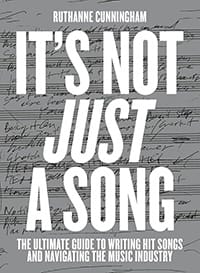
RuthAnne: “If you’re over-prepped you can lose the ability to be open and free.”
Hit songs are made by mastering the nuanced art of the writing room – balancing talent, dynamics, mindset, and human connection
In It’s Not Just A Song, GRAMMY and BRIT-nominated Irish singer-songwriter RuthAnne (Cunningham) offers an unflinching, insider’s view of modern songwriting and the realities of the music industry. Drawing on two decades of experience – both in behind-the-scenes sessions and on her own charting releases – RuthAnne combines personal insight with interviews and case studies with songwriters and superstars including Amy Allen (Sabrina Carpenter, Harry Styles), Steph Jones (Sabrina Carpenter, Selena Gomez), and Emily Warren (Dua Lipa). The result is a guide to creativity, collaboration, and resilience in a world where talent alone isn’t enough.
In this extract, she delves into ‘The Psychology of a Writing Room’, exploring the subtle dynamics, interpersonal skills, and emotional intelligence that underpin successful songwriting sessions. With insight drawn from her own career and contributions from her peers, Cunningham shows that understanding the people in the room can be just as vital as mastering the craft…
More articles related to songwriting books
People skills
 When people say ‘a session’ or ‘a write’ in terms of music, this is when writers/producers and/or artists go into a studio together to write a song. And like I’ve said before, there’s so much more that goes into a song than just the act of writing it. There’s a vibe, an energy, a dynamic, and striking that perfect dynamic leads to the great songs.
When people say ‘a session’ or ‘a write’ in terms of music, this is when writers/producers and/or artists go into a studio together to write a song. And like I’ve said before, there’s so much more that goes into a song than just the act of writing it. There’s a vibe, an energy, a dynamic, and striking that perfect dynamic leads to the great songs.
It’s not just your talent that’s needed, it’s also about having excellent people skills – that really is half the battle. Talent will definitely carry you far but having the people skills on top of talent will take you even further. I’ve seen people go a long way in music on their people skills alone.
It honestly took me years to develop good people skills; it’s something at 17 years old I was not at all ready for, being so young and having no experience whatsoever on how to ‘work a room’ or ‘reading a room’. But I learned from being around other people, observing and taking it all in, so now I find it easier to navigate all the different creative personalities I come across in writing sessions.
I think being in bands most of my life, and also being one of three sisters, has helped me really connect with artists, because I’m incredibly used to the balance of speaking my mind and listening. I also get what it feels like to know you’re going to have to stand by each lyric, melody, and chord so whole-heartedly when you play it in front of an audience, which makes me want to help make the song as personal and authentic to the artist as possible.
Amy Allen
A lot of songwriters will say that most of us are chameleons – malleable, easily adaptable – for the simple fact that sometimes we only have a day with an artist, just a few hours to make a good impression, write a great song and form a trust and bond with creatives and most importantly create a reason for people to want to write with you again and have you in their rooms and vice versa.

RuthAnne: “The truth is, the bad songs will always lead you to the good songs.”
The best writers can play different roles, we’re chameleons. If someone’s on a roll that day maybe it’s their day, and it’s knowing when to stay out of the way and when to jump in.
John Ryan
When I’m writing with the artist in the room, I usually like to spend the first hour or so just talking about anything except music because I feel like it kind of establishes a rhythm of bouncing off of each other and sharing things, and also I’d say 9 times out of 10, someone will say something that just organically turns into the song we end up writing.
Amy Allen
NOTE TO SELF: Being able to get the best out of yourself creatively and the best out of others is a skill, more of a people skill than a writing skill but a very important one in the music industry and a vital one as a songwriter/producer.
Stay in it to win it
Everything about the session beforehand is unknown. Some people prep before sessions – think of title ideas, start some tracks, chords, have some references to talk about to inspire everyone. I like to be a little bit prepped but not over-prepped. If you’re over-prepped you can lose the ability to be open and free, you can be too set on your idea and miss the magic. Being a little bit prepared but staying open is key as it’s the unknown and the unknown can be scary.
I’ve definitely battled with my own anxiety before sessions. The fear of not having any ideas that day, the fear of not delivering. A phrase comes to mind that I’ve told myself a lot of times to help me get out the door: ‘You can’t hit a home run every day.’ And it’s true, if you think you can write a hit song every day, a great song every day, you’re already setting yourself up for failure. No one does that, not even Ed Sheeran… Though his bad songs are still better than most. The truth is, the bad songs will always lead you to the good songs because songwriting is like a muscle – the more you work it out the better it’ll get, you just have to stay in it to win it. There are times where it may take countless songs to get the one that makes it.
Mindset is everything
Your mindset is everything. Being comfortable in the writing room to say every and any idea, being confident in your talent. You’ve got to protect your mindset and energy. You’ve got to be incredibly intuitive and know how to read the room and meet your collaborators where they are at in their heads. Artists can have a lot of pressures and stresses from other aspects of their job and life and the songwriter can have an important role with the artist. I call this ‘the therapist’.
Imagine meeting someone at 1 p.m. on a Tuesday who you have never met before, and you have to get them to instantly like you and get them to feel comfortable enough to tell you their stories and secrets? Oh, and you also have to write a hit song that millions of people will sing that the artist also identifies with, feels attached to and loves all in the same day. The pressure can be immense for everyone. The best songwriters understand how important being a good listener is and being a good ‘therapist’ is and they know how to make an artist or fellow writer feel comfortable enough quite quickly to confide in them. This must be genuine and authentic where everyone you work with can feel disarmed, safe, comfortable and free to let their creativity take over and flow and feel seen, heard and respected.

RuthAnne: “Let courage lead you through the process and the confidence will come.”
Courage vs confidence
The truth is, more often than not songwriters aren’t always confident. Like I’ve said, the writing room is the unknown and no one really knows what the outcome will be of each session. Some days I have so much anxiety about songwriting and sessions. What if I don’t deliver that day? What if the other writers or artist thinks I suck and am the worst writer? What if they have this huge expectation of me that I won’t live up to? What if I don’t impress the artist enough for them to wanna work with me again? Trust me when I say most songwriters feel all these things at times.
Anytime I go into the room with a new collaborator I’m nervous. And when I’m super-nervous I’ll usually bring my guitar and take it out right away because I’m like if all else fails I can just play guitar and hopefully they’ll take me seriously as a musician.
Ilsey Juber
What I like to remind myself is that I don’t have to be confident all the time, every day, at all times, but what I do try to be is courageous. Having the courage to step into the unknown every day creatively can be daunting. You just need to have the initial courage to do it, and once you have the courage to do that and you’ve stepped inside the room, remind yourself of how courageous that really is and the rest will fall into place.
NOTE TO SELF: Let courage lead you through the process and the confidence will come.
Dynamics
What I’ve learned over the thousands of writing sessions I’ve done is how important the dynamics of a writing room are. The dynamic between creatives can really make or break the song. If you get the dynamics right you are already setting your room up for success. And really it comes down to finding your role in the session that day and some days you may need to play multiple roles.
When I look at my diary now, it’s all about looking at it in the sense of the dynamic, and if the dynamic makes sense, then it’s all going to be great.
Jon Shave
To be a great songwriter I believe being in tune and aware of what the room needs is vital. I’ve been offered sessions to join that I have turned down based on feeling it would throw the dynamics off or there would be too many people playing the same role, which can be counterproductive. I’ve also spent years really honing in on the people who I have great writing dynamics with and know my role and where I fit best.
It’s also very important for managers and publishers and A&Rs to understand dynamics in a room and to really be strategic about how many creatives are together in a room. Sometimes people throw seven strong writers in a room together, but that honestly can be too much. Just because everyone is strong at what they do doesn’t mean it’ll be the right dynamic because sometimes it can be overpowering and too many cooks in the kitchen. Always think ahead of the dynamics of a writing room because when you get the balance right it really can make the difference between a good song and a great song.

































Related Articles